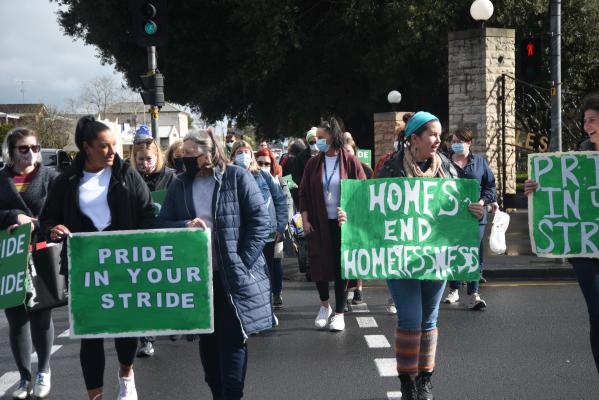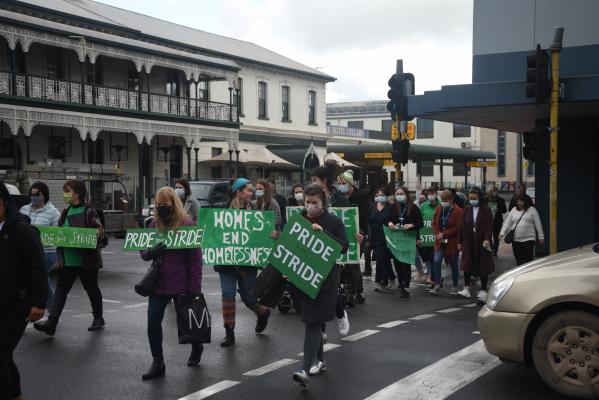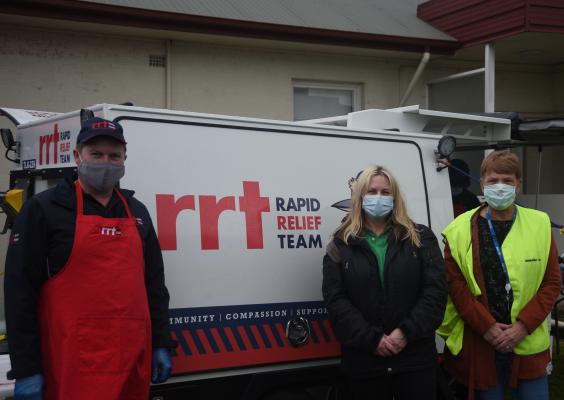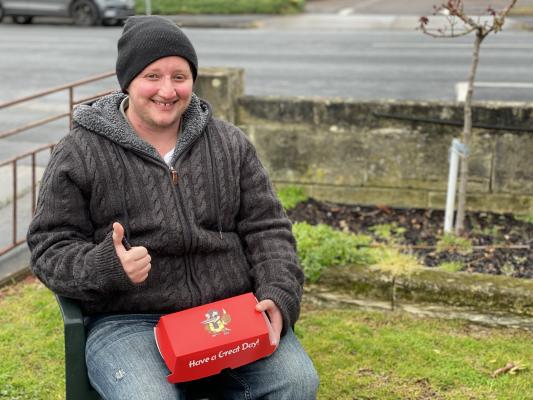
MOUNT Gambier’s housing crisis and homelessness issue was brought to the forefront on Friday as community members walked along Commercial Street during the annual Pride In Your Stride march.
Organised by Uniting Communities – which is operated by ac.care – the National Homelessness Week walk concluded at ac.care’s Mount Gambier Community Centre, where participants learnt about the challenges faced by people in the region and the services available to those in need.
Uniting Communities Therapeutic Youth Service senior coordinator Sharon Gray said the walk aimed to recreate the daily trek many homeless people within Mount Gambier must make each day.
“A person who is experiencing homelessness faces a daily dilemma, as when they wake up they must move from where they are and walk to find food, services and support,” she said.
“The walk across Mount Gambier to ac.care symbolised this daily journey with the community coming together to support those facing homelessness and show that nobody should ever have to walk alone.”
ac.care homelessness and community services manager Trish Spark said ac.care continued to see an increase in the number of people seeking support since JobSeeker Coronavirus supplements were wound back earlier this year.
“Sadly, vulnerable people have seen a perfect storm of government payments being reduced at the same time as house prices are going up across the regions, which translates to higher rent, a lack of affordable options and hardship for people as they are priced out of their homes,” Ms Spark said.
“We are doing all we can to support those facing or at risk of homelessness, but people are being left with nowhere to go as the affordable accommodation and social housing is just not available to help keep people housed.”
Ms Spark believed it was vital there was an increase in investment for social housing, along with a sustainable increase to JobSeeker – which would have long-term benefits for vulnerable people by allowing them to secure independence and a more hopeful future.
“Investing in social housing has not kept up with demand for many years and sadly the current situation is increasingly pricing people out of tenancies and the market, with emergency short-term options filled to capacity and nowhere available for people to move on to, except for a long waiting list,” she said.
“While the buoyant property market is positive for people who already own homes, it is putting housing affordability out of the reach of more people and support must be increased to protect the vulnerable, as services are already being pushed to the limit.”
Mark Collins was faced with this situation a few months ago when the property he was renting was sold.
Looking for an alternative home to move into, he found few affordable options in Mount Gambier, experiencing high competition from applicants each time he applied for a potentially suitable rental property.
“I couldn’t hold (selling their property) against my landlords, it’s a great opportunity for them… but unfortunately it left me in a position where I had to reach out for support,” he said.
Mr Collins began seeing a staff member at ac.care’s Limestone Coast Homelessness Service on a weekly basis, allowing him to pick up donated food and other supplies while at appointments to help extend his budget.
“I was lucky to secure a Housing SA home thanks to the help of ac.care,” Mr Collins said.
Mr Collins said homelessness was not prejudiced, that it can affect anyone and that despite the stigma, it was not a reflection of a person’s personal choices.
“When people find themselves in a position where they don’t have a roof over their heads, (others) tend to think it’s that person’s fault, like somehow, they’ve done that to themselves, and therefore, you know, they need to help themselves,” he said.
“Addictions are real. Mental illness is not easy to deal with: we know that now through more advocacy and education.
“Disability can be difficult for people to live with. And also, just navigating life, in general, can be difficult at times. And it’s not a reflection of you as a person.”
Ms Spark said people from all backgrounds were seeking ac.care’s support, including single parents and couples with children, women who had left domestic violence situations, and single job seekers.
In all, 484 people were assisted in 2020-21, up from 446 in 2019-20.
Ms Gray and Ms Spark expressed gratitude on behalf of both organisations for the broad support they received from the community, Rapid Relief Team (who provided a free lunch to people participating in the march), and businesses, including people who donated shoes – which will be provided to clients of ac.care and Uniting Communities.
Anyone in need of support due to financial hardship or housing insecurity within the Limestone Coast is urged to contact ac.care on 1300 ACCARE (1300 222 273).










